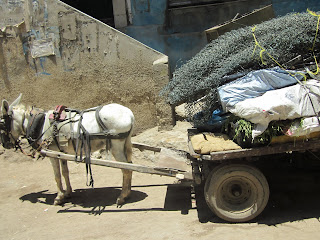
Hazem Mohamed Elshafee is one of about twenty Egyptian adults who come to the Al-Kayan community center in Cairo twice a week for English classes that I teach with several other DukeEngagers. He was born in Kaluobia the biggest city near Sinduon, the village where he grew up. Very interested in learning and tradition from an early age, he enjoyed village life immensely. Hazem's eyes glow when he reminisces about village tea brewed over a wood fire, far superior to the city tea here in Cairo. As a child he fondly remembers wandering the family farm with homemade slingshots. Sinduon is a large enough village that Hazem was able to attend schools close to home through secondary school. He frequently returns to the village to visit family, celebrate high holidays, and check up on the family farm.
Hazem left the village to attend 6 October University where he studied Mechotronic Engineering, a combination of Mechanical and Electrical Engineering. He now works for the Cairo Metro as a maintenance engineer. After one of our first classes together he walked with us to El-Demerdesh metro station. I turned away to buy a metro ticket, and when I looked back Hazem had deftly removed the covering of one the defunct mechanized turnstiles. Within a minute he had run a complete diagnostic and with a few adjustments to the whizzing belts and circuits, the turnstile was functioning once again.
Hazem is always bright and engaged. He’s very excited about improving his English, and it’s apparent that he invests himself fully in everything he chooses to undertake. He’s a jokester and he always has a giddy laugh brewing just under the surface.
Like most Egyptians, he has mixed feelings about the Revolution. Mubarak had been in power for almost his entire life until the Revolution, and Hazem is part of the generation (those now in their 20’s and 30’s) most negatively affected by the failures of the old regime. So the idea of change and Mubarak’s departure are exciting prospects for him. Nevertheless, he is uncertain of the Revolution's future as of July 9. The protests now feel more like festivals, with families and lovers strolling leisurely through the square as vendors sell sweets and t-shirts. He wants to see Egyptians developing and executing plans for a better future while simultaneously protesting for democracy and restitution. He sees some Egyptians using the protests as an alternative to more practical means of improving their situations; they wake up, grab a blanket, and head to Tahrir, rather than going out to find work. Nevertheless he recognizes that many of these protestors are without any alternative recourse.
I’ve really enjoyed getting to know Hazem as both his teacher and his friend. We both like trading stories about our native cultures and experiences in our very different homes. Yet all things considered, I watch him moving through life day-to-day as I would expect any of my American friends to if they were operating with and in the same cultural and historical background and context. Hazem thinks that the internet should be restricted in some ways, and he would be uncomfortable wearing shorts in public, but ultimately he is motivated by his love of God, family, and country. He dreams about a better future as an individual and for Egypt collectively, and he pursues those dreams with optimistic ambition. I admire his determination, extraordinary work ethic, and above all his propensity for laughter and celebration of the simple parts of the human experience that make our seemingly mundane lives extraordinary.








